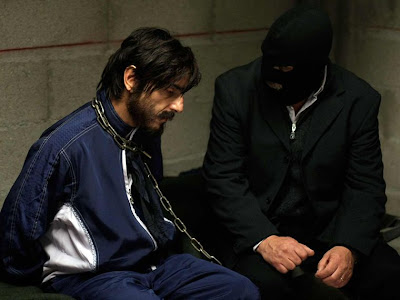
The title card for Lucas Belvaux's Rapt appears twice onscreen during the opening credits, which is the first sign that this film will be doing things a little differently. What could have been a straightforward kidnapping tale is given an extra dimension by the choices this Belgian director takes, and by the manner in which he shifts the focus of the narrative unexpectedly. In a few short, effective strokes, Belvaux sets up his protagonist for a severe fall from grace. Stanislas Graff (Yvan Attal) is the wealthy industrialist who spends his days jet-setting with the French President, but whose nights are spent racking up major gambling debts at poker or spending a few illicit hours with his mistress before heading home to his loyal wife Françoise (Anne Consigny). Oddly, over the course of the film, Belvaux successfully manages to manipulate our perception of this cocky and deceitful character so he eventually earns our sympathy.
And he really does earn it, being put through a terrifying experience by the kidnappers who snatch him in a swift and carefully orchestrated assault. Graff is blindfolded, handcuffed, drugged and taken to an underground location, where the crooks show they mean business by chopping off a finger. The ransom is set at €50 million, which should be no problem for a man of his wealth, the captors reason, but that's where their plan starts to go awry. It seems Graff isn't quite as affluent as the media has suggested, and the corporation he represents shows an unsurprising hesitancy in putting up the cash when revelations about his gambling debts and affairs begin appearing in the tabloids. Belvaux places us in a position of uncertainty regarding Graff's ultimate fate as those who he thought of as his nearest and dearest begin backing away and looking after their own interests. Does anyone even want this guy back?
Belvaux divides his time evenly between Graff's ongoing ordeal, the negotiations between the police and his former business partners, and his family, who are threatening to come apart under the strain. As these discussions about the rights and wrongs of paying the ransom take place in the outside world, Graff begins to feel increasingly isolated, and Attal gives a thoroughly convincing portrait of a confident man rapidly being reduced to a broken, terrified wreck. He flinches and cowers like a beaten dog whenever one of his captors enter the room, and he finally spends much of his time sitting and staring dumbly ahead, seemingly ready to accept whatever fate lies in store, and wondering why he has been forsaken. It's no surprise that he first asks to see his dog when he finally does get home; the only loyalty he can truly count on.
It's not really spoiling Rapt to reveal that Graff does eventually return home. The plot is not the key thing here, as Belvaux seems much more interested in observing human nature, and seeing how these characters react when placed in these extreme situations. While Belvaux stages a couple of tense and gripping sequences, Rapt is ultimately more of a character study than a straightforward thriller, and it impresses on both levels. The final scenes are fascinating, as we watch Graff, a man much changed by his traumatic experience, wandering through the debris of his former life, looking at those around him with fresh eyes, and pondering his next move. Belvaux closes the film just as Graff makes an agonising choice, and in an appropriately ambiguous move, he leaves the audience to speculate on the character's ultimate decision.
